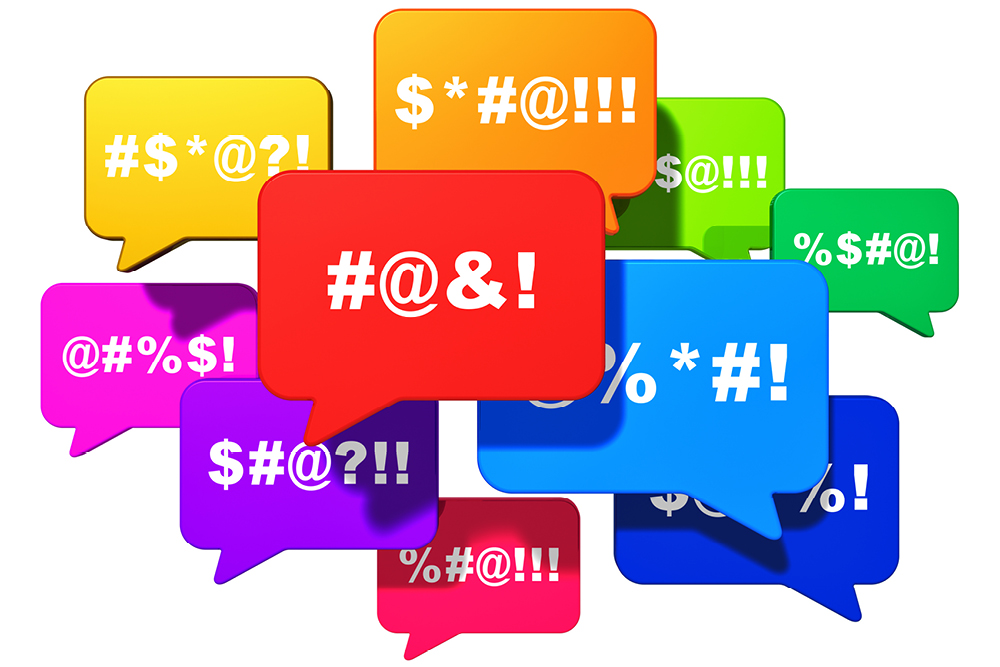Inventing Profanity: What to Write When You Can’t Say “Duck”
So, there you are, writing away when the f-bomb splatters onto the page. Some markets won’t have a problem with this, but what if you’re writing for a PG-13 market, or what if your target market is OK with some profanity, but you like to use it a lot? I can already hear the rebuttal. “But Kary, my character isn’t the type to say, ‘golly gee.’ I need something stronger.”
The answer’s easy: create your own curse words.
Sometimes it just has to sound right
Profanity has a certain sound to it. It’s usually short, sharp, single syllables with hard consonants or sounds you can lean into as if you’re spitting. In Battlestar Galactica, the word of choice was “frack.” Farscape’s “frell” sounded softer but got the job done. C.S. Friedman used “vulk” in her Coldfire series, where volcanic activity was a plot point.
Tie it into your world-building
When inventing profanity, think of it like any other world-building task. Your world has its own names, its own money, its own countries, and political systems, so why shouldn’t it have its own profanity? I’ve already mentioned C.S. Friedman, where volcanic activity triggers world-altering events, but Anne McCaffrey is another example. In her popular Pern books, dragons lay eggs in hot sands, so Pernese cursing includes things like “Shards!,” “Shells!,” “By Faranth’s first egg!,” and “Scorch it!”
Think about the world in your story. What events in history have produced momentous outcomes? In one of my worlds where there was a Krakatoa-like explosion, “Shadow and ash!” is a common oath.
Is there a religious system you can launch from? Elizabethan cursing included things like “God’s Teeth!,” so think about your religious system and swap in the name of a relevant ruler or deity.
Go beyond the f-bomb
In Space: Above and Beyond, the alien enemy resembles an Earth insect called chiggers, so “chig” and “chigger-lover” made perfect slurs. It’s probably no accident that chigger rhymes with an American racial slur that’s largely unprintable in many markets. Orson Scott Card’s Ender series did something similar with the buggers, leaning on an alternate meaning of “bugger” to enhance slur.
Heinlein blended two gender-based insults to come up with “slitch,” and Farscape used “tralk” to mean the same thing.
Use context to provide meaning
Don’t try to explain your invented curse words. They should be clear from the context. If your character gets kneed in the groin, have his companion wince and say, “Ooh, right in the choobies!” Your reader will know exactly what’s going on.
Be creative
Be creative with your profanity. Invent your own insults and vulgarities, and make them an integral part of your world. Doing so will give your characters freedom of expression in almost any market.

Kary English grew up in the snowy Midwest where she avoided siblings and frostbite by reading book after book in a warm corner behind a recliner chair. She blames her one and only high school detention on Douglas Adams, whose Hitchhiker’s Guide to the Galaxy caused her to laugh out loud while reading it behind her geometry textbook.
Today, Kary still spends most of her time with her head in the clouds and her nose in a book. To the great relief of her parents, she seems to be making a living at it. Her fiction includes several short stories and a fantasy saga about a little girl and an orange kitten. Kary’s highest aspiration is to make her own work detention-worthy.
Kary is a Hugo and Campbell nominee and Writers of the Future winner whose fiction has appeared in L. Ron Hubbard Presents Writers of the Future Volume 31, the Grantville Gazette, Daily Science Fiction, and Galaxy’s Edge.




Fudge! Laughing so hard!
Darnedy! This is so funny!
Son of Pilsbury Doughboy! This is great stuff! I’ve googled old swear / vulgar words and learned that “fart” is one of the oldest, coming from the 13th century.